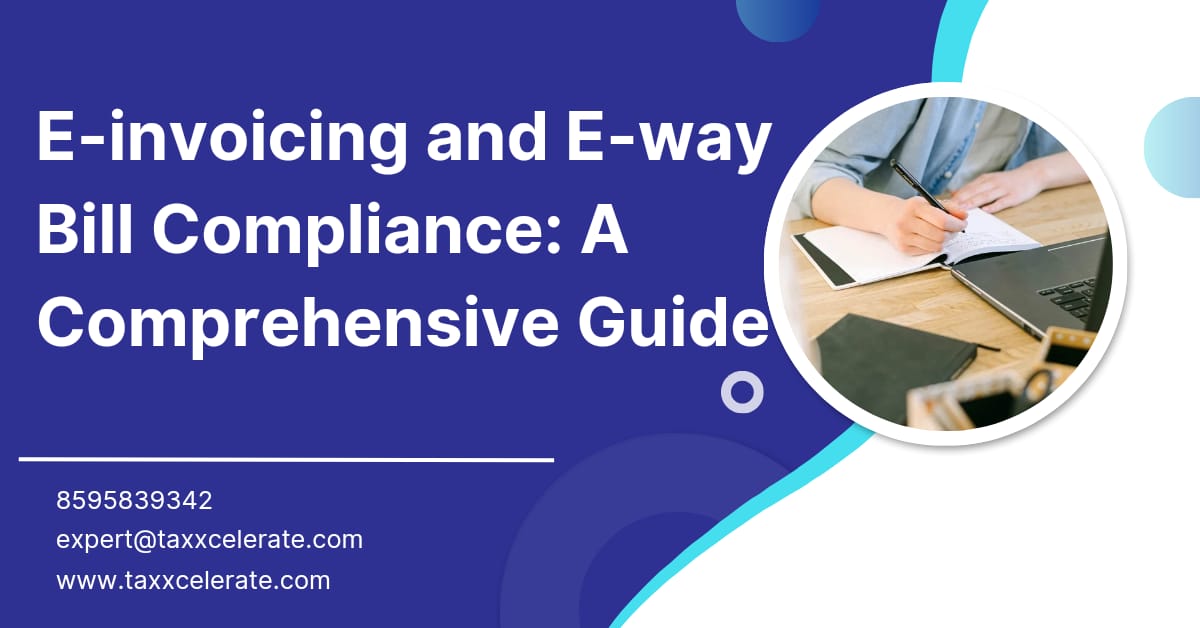In today’s fast-paced business environment, staying compliant with tax regulations is crucial for every business. Among the many regulatory requirements, E-invoicing and E-way Bill compliance have emerged as essential components of the Goods and Services Tax (GST) framework in India. These tools not only streamline the invoicing and transportation process but also enhance transparency and reduce tax evasion. In this blog, we’ll delve into what E-invoicing and E-way Bill compliance entail, why they are important, and how your business can navigate these regulations effectively.
What is E-invoicing?
E-invoicing, or Electronic Invoicing, refers to the system where B2B invoices are electronically authenticated by the GST Network (GSTN) for further use on the common GST portal. Introduced by the Indian government to simplify the invoicing process and curb tax evasion, E-invoicing ensures that the invoice data is reported to the tax authorities in real-time.
Key Features of E-invoicing:
- Standardization: E-invoicing follows a standard format, ensuring uniformity across businesses.
- Real-time Tracking: The Invoice Reference Number (IRN) is generated in real-time, allowing for immediate validation by the GSTN.
- Integration: E-invoices can be seamlessly integrated with ERP systems, making the invoicing process more efficient.
- Reduced Errors: Automation reduces manual errors, improving accuracy in reporting.
Who Needs to Comply?
As of 2024, E-invoicing is mandatory for businesses with an aggregate turnover exceeding ₹10 crore. However, the threshold is expected to decrease in the future, potentially bringing more businesses under its purview.
What is an E-way Bill?
An E-way Bill is an electronic document required for the movement of goods worth more than ₹50,000 within or across states in India. This document needs to be generated before the goods are transported and serves as proof of the movement of goods.
Key Features of the E-way Bill:
- Mandatory for Goods Movement: An E-way Bill is required for the movement of goods both inter-state and intra-state.
- Validity: The validity of the E-way Bill depends on the distance to be covered by the goods. Typically, it is valid for one day for every 100 kilometers.
- Linked with GST: The E-way Bill system is integrated with the GST system, ensuring that tax payments are closely monitored.
- Real-time Monitoring: Authorities can track the movement of goods in real-time, ensuring compliance.
Who Needs to Comply?
Any registered person transporting goods worth more than ₹50,000 is required to generate an E-way Bill. This applies to both inter-state and intra-state transportation of goods.
Why is Compliance Important?
- Avoid Penalties: Non-compliance with E-invoicing and E-way Bill requirements can result in hefty fines, legal action, and disruptions in business operations.
- Smooth Operations: Proper compliance ensures that your goods move smoothly across states without delays at checkpoints or seizures by tax authorities.
- Enhanced Credibility: Compliance with regulations enhances your business’s credibility with customers and partners, building trust and reliability.
- Audit Preparedness: Maintaining proper records of E-invoices and E-way Bills ensures that your business is well-prepared for any GST audits.
How to Ensure Compliance?
- Integrate Technology: Use ERP systems or accounting software that integrates with the GST portal to automate E-invoicing and E-way Bill generation.
- Regular Training: Keep your team updated with the latest GST regulations and ensure they are trained in generating and managing E-invoices and E-way Bills.
- Periodic Audits: Conduct regular internal audits to ensure that your E-invoices and E-way Bills are compliant with GST rules.
- Seek Professional Help: Consult with GST experts or firms like Taxxcelerate to ensure that your business remains compliant with the latest regulations.
Conclusion
E-invoicing and E-way Bill compliance are no longer optional for businesses operating in India. They are essential for maintaining smooth operations, avoiding penalties, and ensuring long-term success. By understanding these requirements and implementing the right tools and practices, your business can stay ahead of the compliance curve.
For personalized assistance with GST compliance, including E-invoicing and E-way Bill management, explore the services offered by Taxxcelerate. Our team of experts is here to help you navigate the complexities of GST with ease.




[…] sildenafil tablets 50mg […]
Вызов электрика в Москве — цены и качество
Электрика заказать Москва [url=http://www.elektrik-master-msk.ru]http://www.elektrik-master-msk.ru[/url] .